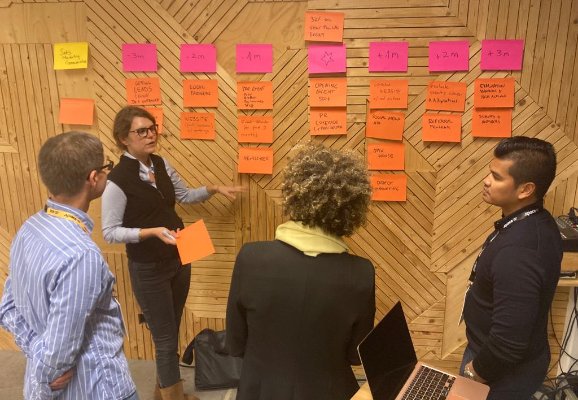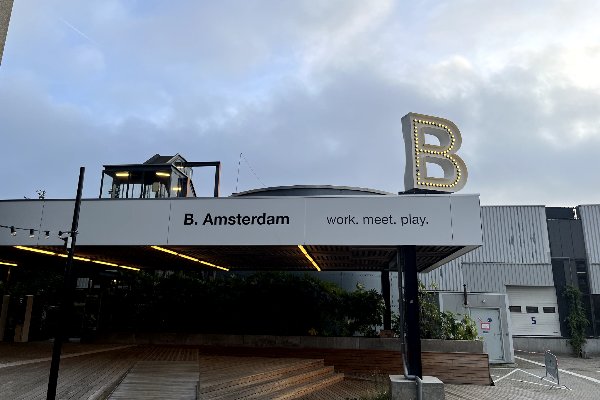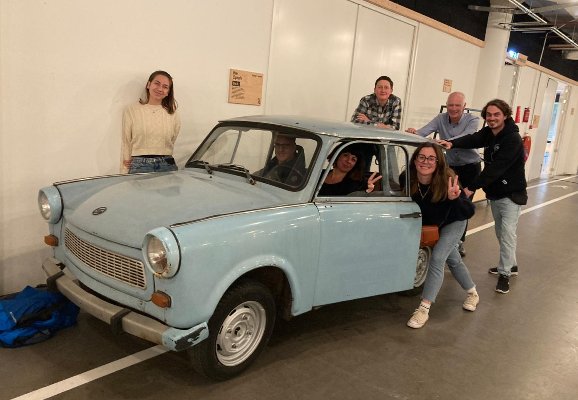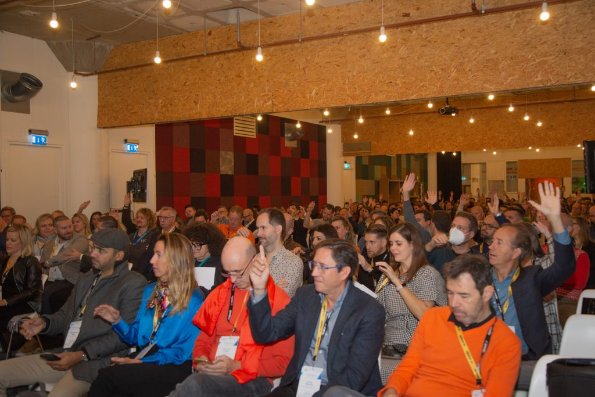Coworking Europe a global community
It was exciting to reconnect with industry peers and meet new colleagues from all over the world, from the United States to Japan. It has been 3 years since the last face-to-face edition, which was held in Warsaw.
This year we have found a mature market with consolidated and experienced operators, both large and independent brands.
The two days were characterized by enthusiasm, a great desire to share and many inspiring conversations among the participants. An excellent program reflecting a sector that, despite the damage caused by the pandemic, has managed to adapt and consolidate. Two fantastic parties to finish off the networking in the Social Hub and Mindspace spaces at the end of each day. Yes, we had a great time!
What we learnt at the conference
The content was one of the strong points of the conference. You can see the program and pictures here.
Here is a summary of the talks we found most educational: the presentation on the demand for new products, the round table on management models, the presentation on plastic-free coworkings and the workshop where 20 expert operators designed and co-created the launch strategy for a new coworking space.
Demand for new products in 2023
Mike LaRosa of the Upflex space platform, presented the trends occurring in some of the platform’s products. A study resulting from surveys conducted with its users. The study collects more than 12,000 bookings in European spaces and identifies opportunities in product offerings such as flex tables, private offices and meeting rooms.
Trends – Hot Desks:
- Average Day Pass price: $28 / €27.
- Rate range for TIER 1 markets (London, Paris): $40-$60.
- Rate range for TIER 2 markets (Barcelona, Warsaw): $30.
- Phone booths:
- Users are twice as likely to book a hot desk in spaces that have phone booths available.
- Users are 5 times more likely to repeat returning to coworking if there are enough phone booths.
- Users would pay additional money to book a hot desk with a phone booth.
- Monitors:
- Users are 4 times more likely to book a hot desk at coworkings that offer the use of monitors.
- Users would pay an average of $14 more for a table with a monitor.
- Standing desks:
- Users are twice as likely to book a table at a coworking with standing desks.
- Users would pay an average of $20 more to reserve standing desks.
Trends – Private Offices:
- Although private offices (per days) represent the lowest percentage of inventory on the platform, they are the most requested product.
- The highest requests are for private offices of 2 to 4 desks.
- The average price for this product is above $275 and you can easily earn $100 per person per day.
- The new coworking: working with colleagues in a private office is preferred over traditional open spaces with flex desks.
- Recurring bookings: 60% of users say they would be more likely to book a premium product such as a private office (by the day) if they could do so on a recurring basis.
Trends – Meeting Rooms:
- Manage expectations: deliver what you advertise. The first complaint received is that most meeting rooms booked do not reflect in the profile on the platform what they actually are; whether it is photos, lack of audiovisual equipment or a different seating configuration.
- Extended hours:
- 15% of rejected meeting room requests were due to operators not opening their space 30 minutes earlier than the user requested.
- The average rate for these rejected meeting room requests was $485/booking.
- Meetings and food: the No. 1 request Upflex has received associated with meeting room bookings is for food. Operators have the opportunity to increase their sales or by adding this service for an additional fee.
- Size matters:
- In 2022, requests for meeting rooms for less than 4 people decreased 32% year-over-year, while requests for meeting rooms for more than 8 people increased twice as much.
- The fastest growing segment of meeting room bookings is for 20+ people and is typically booked for full days or multiple days (for events).
General trends:
- Next to phone booths, the amenity preferred by users is free parking. If you have free parking, market it. If you have paid parking, consider the economic advantages, it will help you attract your customer.
- Dynamic pricing: New advances in space management platforms and access control solutions are starting to enable dynamic pricing. Use technology to charge a higher price on peak days (Tuesday through Thursday) and a reduced price during off-peak periods.
- Educate a new type of user: The demand for coworking in terms of volume and growth currently comes from businesses. Add additional information, descriptions, floor plans, etc. to your ads to help facilitate the booking process and use of the space.
Partnerships, revenue sharing, profit sharing and other innovative models to find the best risk-sharing agreement with owners
One of the most interesting panels of the conference, the table consisted of Alain Brossé (Industrious), John Price (Hub Australia), Elad Hod (Uffizis) and Caleb Parker (NewFlex), moderated by Pauline Roussel (Coworkies).
The panel dove into a conversation that explored business models that present greater flexibility for both the operator and the owner compared to traditional leasing. Each of the panelists provided information on how each of them approaches the moment of negotiation with the landlord and commenting on what type of models they tend to realize even though no specific percentages were provided. Within these, different modalities of management contract, hybrid lease, percentage of revenue, revenue splitting, among others, were mentioned.
COVID-19 set a precedent in the real estate market, specifically in the need for flexibility on the part of the operator. However, the increased flexibility in the lease can be seen as a major risk in the eyes of the landlord. A property owner usually seeks a stable monthly income, so when another type of model that escapes from this rigidity is presented, it generates insecurity and distrust. In addition, it is important to understand that the coworking industry has not reached maturity in many places, so that also generates greater distrust when negotiating.
These innovative business models seek agreements that balance risk and profit. For example, in a management contract it was commented that the operating company takes a percentage (4-10%) of gross revenues and/or a portion of net revenues (5-10%), giving some leeway to the owner until the result is robust.
In conclusion, the importance of achieving a relationship of trust with the owner was stressed, treating each negotiation as unique, without rigidly standardizing the process.
Sustainability: Plastic-free Coworkings
Manuel Maqueda, expert in circular economy and regenerative economy, gave a powerful presentation addressing plastic as a plague in our society and what we as operators can do to exterminate it.
The growth of plastic is exponential. The reality is that plastic never disappears from our planet, but rather degrades into what is called “microplastics”. Today, approximately 450 million tons of plastic are produced, of which 40% is destined as single-use plastics (basically manufactured waste) and 30% of this ends up in the environment. And above all, neither recycling nor biodegradable plastics are the solution to this huge problem: it can only be eradicated by eliminating it at its root.
The damage doesn’t just impact the environment. Such are the quantities spread around the world that microplastics have already been found in food and blood, becoming a harmful factor for health.
From SUPER, a sustainability certification based on the elimination of plastics, they invite us to “de-plasticize” our coworkings. The following are 4 areas of action: drink, food, work and community.
Beverage:
- Bottles
- Cups
- Sorbets, stirrers
- Coffee capsules
- Tea bags
Food:
- Cutlery
- Plates
- Packaged food (sweets, snacks)
Work:
- Highlighters
- Plastic-wrapped paper
- Post-its wrapped in plastic
- Individual soap dispensers
Community:
- Plastic badges
- Signage
And to think… “What else can be eliminated or replaced?”
Zach Douglas, CEO and co-founder of Orega, accompanied Manuel in his presentation as a coworking operator that adopted the certification process, and the results were significantly positive.
Designing the critical steps towards opening a new coworking space (or opening the next one)

Dynamic workshop facilitated by Vanessa Sans of HWL and Claire Carpenter of The Melting Pot where 20 expert operators co-created the launch strategy and action plans to get a coworking center up and running during the 3 months before and after its opening date.
Six groups were formed among the 20 attendees. Each group focused on a business area to develop in 20 minutes the monthly action plan:
- IT, technical resources and security.
- Human resources for the delivery phase.
- Sales, marketing and communication.
- Community development.
- Set-up and tuning.
- Internal operations development.
The outcome of the workshop… we will share it later. Stay tuned!
Featured image: B.Amsterdam.
This article was written by Agustina Paradella and Vanessa Sans.


